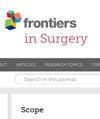膝关节骨关节炎医学膝关节磁共振成像的知识图谱和文献计量分析(2004-2023 年)
IF 1.6
4区 医学
Q2 SURGERY
引用次数: 0
摘要
目的磁共振成像(MRI)越来越多地用于检测膝关节骨性关节炎(KOA)。在本研究中,我们旨在系统研究全球应用医用膝关节磁共振成像治疗 KOA 的研究现状,分析研究热点,探索未来趋势,并以知识图谱的形式呈现研究结果。方法在 Web of Science 核心数据库中检索 2004 年至 2023 年间有关医用膝关节磁共振成像扫描治疗 KOA 患者的研究。CiteSpace、SCImago Graphica 和 VOSviewer 用于国家、机构、期刊、作者、参考文献和关键词分析。美国和欧洲是主要国家。波士顿大学是主要研究机构。骨关节炎与软骨》是主要杂志。最常被引用的文章是 "骨关节病的放射学评估"。Guermazi A 是发表文章数量和参考文献总数最多的作者。与核磁共振成像和 KOA 关系最密切的关键词是 "软骨"、"疼痛 "和 "损伤"。利用 MRI 评估局部组织损伤和病理变化特征与临床症状之间的关系。(2)通过 MRI 分析 KOA 的危险因素,确定 KOA 的早期诊断。利用MRI评估多种干预KOA组织损伤(如软骨缺损、骨髓水肿、骨髓微骨折和软骨下骨重塑)的疗效。人工智能,尤其是深度学习,已成为 KOA 核磁共振成像应用研究的重点。本文章由计算机程序翻译,如有差异,请以英文原文为准。
Knowledge mapping and bibliometric analysis of medical knee magnetic resonance imaging for knee osteoarthritis (2004–2023)
ObjectivesMagnetic resonance imaging (MRI) is increasingly used to detect knee osteoarthritis (KOA). In this study, we aimed to systematically examine the global research status on the application of medical knee MRI in the treatment of KOA, analyze research hotspots, explore future trends, and present results in the form of a knowledge graph.MethodsThe Web of Science core database was searched for studies on medical knee MRI scans in patients with KOA between 2004 and 2023. CiteSpace, SCImago Graphica, and VOSviewer were used for the country, institution, journal, author, reference, and keyword analyses.ResultsA total of 2,904 articles were included. The United States and Europe are leading countries. Boston University is the main institution. Osteoarthritis and cartilage is the main magazine. The most frequently cocited article was “Radiological assessment of osteoarthrosis”. Guermazi A was the author with the highest number of publications and total references. The keywords most closely linked to MRI and KOA were “cartilage”, “pain”, and “injury”.ConclusionsThe application of medical knee MRI in KOA can be divided into the following parts: (1). MRI was used to assess the relationship between the characteristics of local tissue damage and pathological changes and clinical symptoms. (2).The risk factors of KOA were analyzed by MRI to determine the early diagnosis of KOA. (3). MRI was used to evaluate the efficacy of multiple interventions for KOA tissue damage (e.g., cartilage defects, bone marrow edema, bone marrow microfracture, and subchondral bone remodeling). Artificial intelligence, particularly deep learning, has become the focus of research on MRI applications for KOA.
求助全文
通过发布文献求助,成功后即可免费获取论文全文。
去求助
来源期刊

Frontiers in Surgery
Medicine-Surgery
CiteScore
1.90
自引率
11.10%
发文量
1872
审稿时长
12 weeks
期刊介绍:
Evidence of surgical interventions go back to prehistoric times. Since then, the field of surgery has developed into a complex array of specialties and procedures, particularly with the advent of microsurgery, lasers and minimally invasive techniques. The advanced skills now required from surgeons has led to ever increasing specialization, though these still share important fundamental principles.
Frontiers in Surgery is the umbrella journal representing the publication interests of all surgical specialties. It is divided into several “Specialty Sections” listed below. All these sections have their own Specialty Chief Editor, Editorial Board and homepage, but all articles carry the citation Frontiers in Surgery.
Frontiers in Surgery calls upon medical professionals and scientists from all surgical specialties to publish their experimental and clinical studies in this journal. By assembling all surgical specialties, which nonetheless retain their independence, under the common umbrella of Frontiers in Surgery, a powerful publication venue is created. Since there is often overlap and common ground between the different surgical specialties, assembly of all surgical disciplines into a single journal will foster a collaborative dialogue amongst the surgical community. This means that publications, which are also of interest to other surgical specialties, will reach a wider audience and have greater impact.
The aim of this multidisciplinary journal is to create a discussion and knowledge platform of advances and research findings in surgical practice today to continuously improve clinical management of patients and foster innovation in this field.
 求助内容:
求助内容: 应助结果提醒方式:
应助结果提醒方式:


